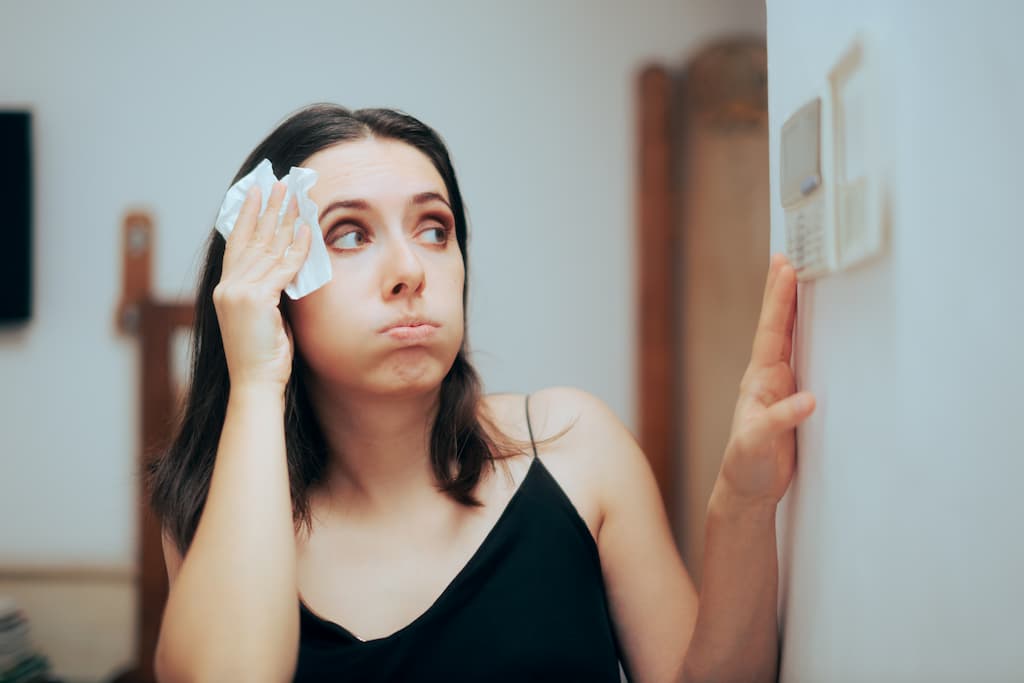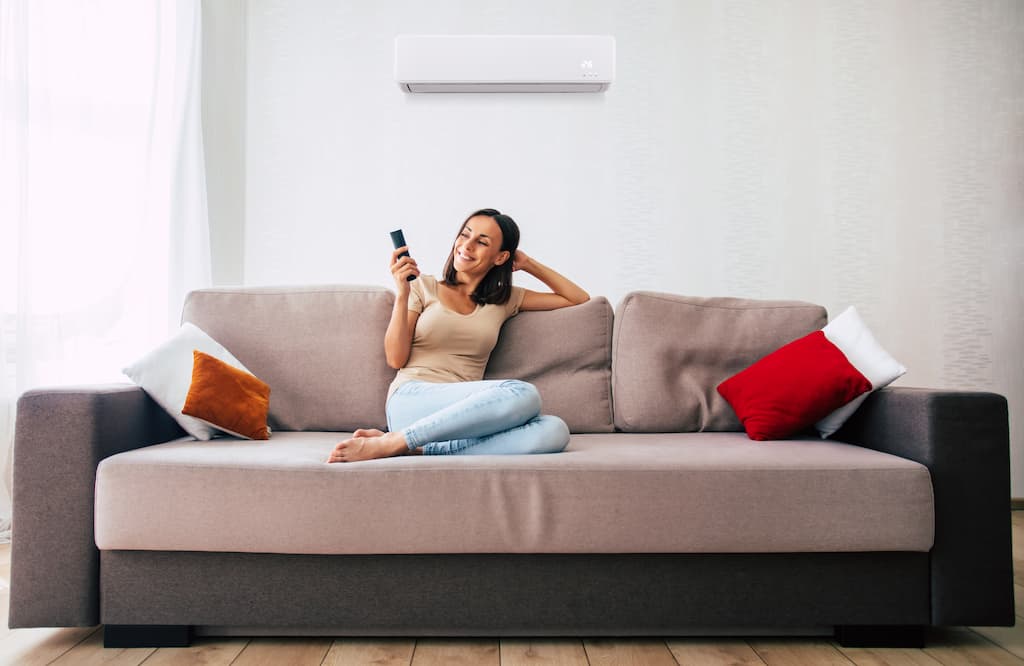Do I Need a 2nd Air Conditioner Upstairs?
If you have a two-story house then you know how hard it is to keep that upstairs cool. A second AC unit may be worth looking into!
Let’s say you set the thermostat to 68 and it’s comfortable but the upstairs is still 75. St. Charles and St. Louis weather get hot and muggy. This can cause your bill to go sky-high while you are trying to keep it cool. Fortunately the folks at No Problem Heating & Cooling have some solutions for you!

Keeping Your Upstairs Cool
Review this check list and video for easy solutions you can implement in your home to help make your upstairs cooler and more comfortable, with or without a second AC unit.
Ceiling Fans
Adding ceiling fans to an upstairs room can make the room up to 4 degrees cooler, Plus, the cooling sensation of the air moving helps how comfortable you feel.
Thermal Insulated Drapes
Installed thermal insulated curtains or drapes over your windows. Besides bringing a beautiful aesthetic to your home, closing thermal insulated drapes when there is direct sunlight will keep your rooms from heating up in the sun.
Attic Insulation
Check your attic to make sure you have the proper amount of insulation and that there are no leaks. (This is good to do anyway!)
Open Your Windows
Check the weather outside. Sometimes it’s cooler outside than it is inside. Only do this if you feel safe to do so. And allergy sufferers, we understand this just isn’t a good solution for you. Fortunately, there are several ways to get AC to your second level rooms.
Check Your Filter
Here’s an HVAC Pro Tip for you: Check your air conditioner’s air filter. It could be just that it needs a good cleaning!
Factors to Consider
When considering adding a second AC unit to your upstairs, several important factors must be taken into account.
Cost
Buying a two AC unit is going to cost more than purchasing one. However, if you have two units, you will not need as big of a second one. Generally, the money you are going to save monthly will offset the cost of the unit upstairs. Keep in mind, it also has a lot to do with how often you use the AC. The good news is that a well-planned second AC unit can significantly enhance indoor comfort and energy efficiency.
Is Your Central AC System Outdated?
Unfortunately older central air conditioning systems are typically less energy-efficient, leading to higher electricity bills and increased carbon emissions. Their outdated technology often results in uneven cooling, discomfort, and excessive noise.
A certified HVAC technician can also assess your existing HVAC system’s capacity to handle an additional unit. They can also evaluate if your current electrical system can support the increased load and that there’s adequate space for installation. This alone can help determine what kind of solution would work best for your home.
How Many Rooms on Your Second Floor?
How many rooms do you have on the upper level that are uncomfortable? Heat rises so your air conditioner is going to be running all the time if you are trying to get the upper level to have the same temperature as the main floor. The more rooms you have upstairs, the more your air conditioner is going to be working overtime. A certified HVAC technician will help you evaluate the size and layout of your upstairs area to determine the appropriate cooling capacity required. Factors like insulation, windows, and ceiling height will impact this decision. Consider energy efficiency and choose a unit that complies with modern standards to minimize long-term operating costs.
Types of Second Floor Air Conditioning Systems
There are several types of air conditioners designed for second story applications and cooling needs. Here are the most common types:
Zoned System
Yes, you can have a single unit with two or more thermostats. This will help cool the house evenly as well. The zones system has dampers in the ductwork that open and close to regulate airflow and temperature in each zone. A regular central air system pushes cool air to the entire house. A single zone has the most advantages of the two-unit system. The house is divided into two zones upstairs and downstairs. Each zone has its thermostat to control each area.
Split Air Conditioner
Split air conditioning systems consist of an indoor unit (evaporator) and an outdoor unit (condenser). They’re more flexible than window units and can cool single rooms or multiple rooms if multiple indoor units are connected to a single outdoor unit.
Ductless Mini Split
Similar to split systems but without the need for ductwork. Ductless mini splits are highly efficient and provide zoned cooling, making them suitable for the older homes we see in St. Charles and St. Louis, room additions, and garages.
Packaged Terminal Air Conditioners (PTAC)
Most commonly called PTAC in the HVAC industry, Packaged Terminal Air Conditioners are commonly found in hotels and apartment buildings. These are self-contained units that fit into a wall or window opening.

Window Air Conditioners
These are easily accessible and easy to install by homeowners and renters. Window air conditioners are single, self-contained units installed in windows or wall openings. They’re suitable for cooling individual rooms or small spaces.
Portable Air Conditioners
Portable air conditioners are standalone units on wheels that can be moved from room to room. They’re suitable for cooling small spaces.
Benefits of a Second Floor Air Conditioner
Installing a second-story air conditioner, often referred to as a dedicated or supplementary unit for the upper floor of a multi-story home, offers several benefits:
Improved Comfort
A second-story AC unit ensures that the upper level of your home remains cool and comfortable, addressing the common issue of hot spots or uneven cooling in multi-story houses.
Energy Efficiency
By having a separate unit for the upper floor, you can tailor cooling to the specific needs of that area. This can result in energy savings because you won’t have to cool the entire house to achieve comfort on the second floor.
Zoned Cooling
Zoning allows you to control the temperature independently on each floor, enhancing comfort and reducing energy waste. This is especially beneficial when different family members have varying cooling preferences.
Reduced Strain
A second AC unit can reduce the workload on your primary unit, extending its lifespan and reducing the need for frequent repairs and maintenance.
Backup to Failures
In the case where one AC unit fails, the other one will hold you over until you can schedule repairs.
Improved Indoor Air Quality
Separate units can include advanced air purification systems, ensuring cleaner air on the second floor.
Resale Value
The addition of a second-story AC unit can increase the resale value of your home as it is an attractive feature for potential buyers.
Summary
While there are clear benefits to installing a second-story air conditioner, it’s essential to have the system professionally designed and installed to ensure optimal performance and efficiency. Additionally, consider factors like zoning, thermostat controls, and maintenance to maximize the advantages of having a dedicated AC unit for the upper floor of your home.
A lot of the older homes in and around St. Charles and St. Louis MO have a tough time keeping upstair room temperatures at steady levels. Do you need a second air conditioner upstairs? If you think you do, please give No Problem Heating and Cooling a call.
Schedule Service or Request a Quote
Areas We Serve
Proudly installing, repairing, and maintaining all types of residential and commercial HVAC systems in St Charles and the St Louis Metro Areas.
- St Charles County, Missouri
- St Louis County, Missouri
- Warren County, Missouri
- Franklin County, Missouri


